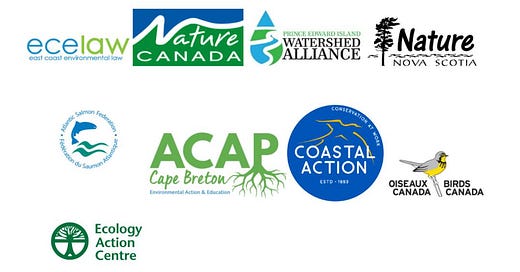Environmental groups sign joint statement denouncing downgrading of wetland policy
Nine environmental groups, including the Ecology Action Centre, East Coast Environmental Law, Nature Nova Scotia, and the Atlantic Salmon Federation released a joint statement today denouncing the downgrading of the province’s Wetland Conservation Policy. The statement reads in part:
WSS [Wetlands of Special Significance] designation will now only apply to wetlands known to support Threatened and Endangered species, and excludes species designated as “Vulnerable” under the provincial Endangered Species Act or “Special Concern” under the federal Species at Risk Act, and will now only apply to the portion of a wetland directly supporting Species at Risk (SAR) or to the portion of wetlands that overlap with protected areas (e.g., a Provincial Park). Additionally, the Department will no longer consider SAR occurrences in historic databases or previous applications when identifying and designating WSS. Finally, the scope of the necessary public function exception has been drastically expanded, and now includes housing, commercial/industrial, and renewables.
As previously reported here and here, a “routine clarification” that was communicated internally in the Department of Environment and Climate Change, but is not being made public, has weakened the policy, and has functionally delisted a significant — likely thousands of hectares — of wetlands of special significance.
Importantly, the joint statement points out that the changes were made without any public input or consultation from scientists or experts in the field.
The statement goes on to list a number of recent processes that concluded wetland policy needs to be strengthened rather than weakened.
It notes that in 2022, the Mersey Tobeatic Research Institute (MTRI) came up with recommendations for how to strengthen Nova Scotia’s Wetland Conservation Policy and ensure the province is meeting its obligations. Ironically, the work was partially funded by the very department that is now surreptitiously weakening the policy — and unwilling to be transparent about it.
According to the Joint Statement, the MTRI report found that Nova Scotia’s wetlands of special significance could be “greatly improved by modestly expanding WSS criteria for crown land without significantly increasing the amount of protected wetlands.”
It also noted that “added protections are even more important considering the warming global climate, which threatens wetlands in Nova Scotia from drought, and the global decline of biodiversity, including species at risk. More can and should be done to better improve the WSS and other wetland policies,” reads the statement, which adds that to date, none of the recommendations from the MTRI report have been incorporated.
The joint statement also points out that earlier this year, on World Wetlands Day, two workshops took place in Halifax Regional Municipality that included members of the public as well as professionals “whose work intersects with wetlands and wetland issues.” The meetings culminated in a report, that called for stronger wetland protection.
As I’ve previously reported, I filed a FOI request to find out more about the internal machinations taking place in the provincial department— one that clearly seems to have lost its way when it comes to both its mandate to protect the environment and the requirement, in a democracy, to be transparent about policy decisions.
Stay tuned.





